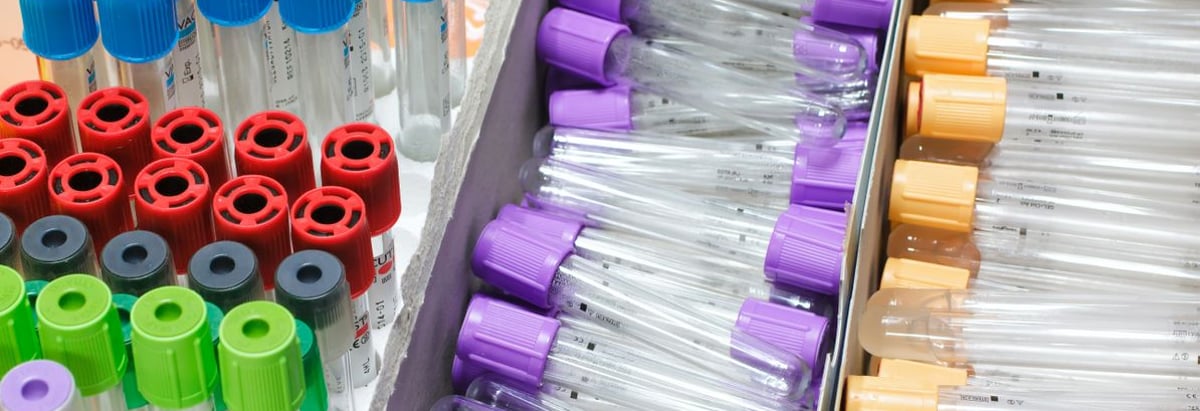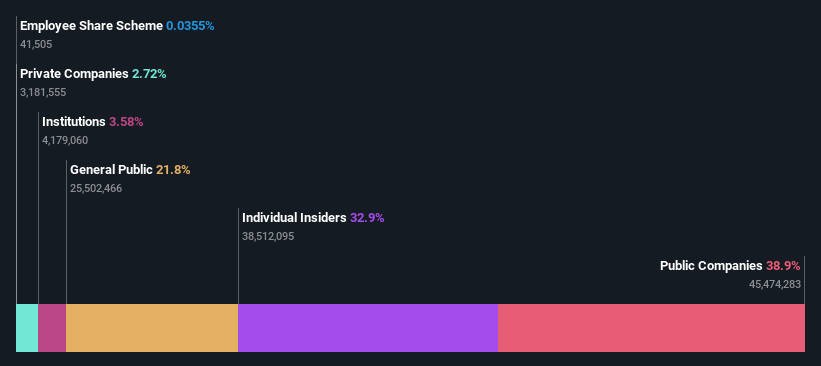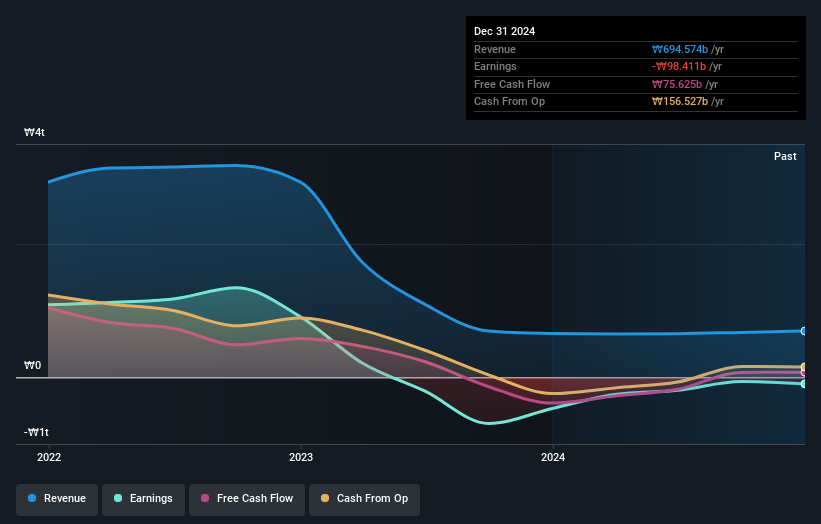- South Korea
- /
- Medical Equipment
- /
- KOSE:A137310
Public companies who hold 39% of SD Biosensor, Inc (KRX:137310) gained 6.7%, insiders profited as well

Key Insights
- Significant control over SD Biosensor by public companies implies that the general public has more power to influence management and governance-related decisions
- The top 2 shareholders own 67% of the company
- Insiders own 33% of SD Biosensor
To get a sense of who is truly in control of SD Biosensor, Inc (KRX:137310), it is important to understand the ownership structure of the business. The group holding the most number of shares in the company, around 39% to be precise, is public companies. Put another way, the group faces the maximum upside potential (or downside risk).
While public companies were the group that reaped the most benefits after last week’s 6.7% price gain, insiders also received a 33% cut.
Let's delve deeper into each type of owner of SD Biosensor, beginning with the chart below.
Check out our latest analysis for SD Biosensor

What Does The Institutional Ownership Tell Us About SD Biosensor?
Many institutions measure their performance against an index that approximates the local market. So they usually pay more attention to companies that are included in major indices.
Since institutions own only a small portion of SD Biosensor, many may not have spent much time considering the stock. But it's clear that some have; and they liked it enough to buy in. If the business gets stronger from here, we could see a situation where more institutions are keen to buy. When multiple institutional investors want to buy shares, we often see a rising share price. The past revenue trajectory (shown below) can be an indication of future growth, but there are no guarantees.

Hedge funds don't have many shares in SD Biosensor. BioNote, Inc. is currently the company's largest shareholder with 39% of shares outstanding. Young-Shik Cho is the second largest shareholder owning 28% of common stock, and Hyo-Gun Lee holds about 3.6% of the company stock.
A more detailed study of the shareholder registry showed us that 2 of the top shareholders have a considerable amount of ownership in the company, via their 67% stake.
While it makes sense to study institutional ownership data for a company, it also makes sense to study analyst sentiments to know which way the wind is blowing. Our information suggests that there isn't any analyst coverage of the stock, so it is probably little known.
Insider Ownership Of SD Biosensor
While the precise definition of an insider can be subjective, almost everyone considers board members to be insiders. Management ultimately answers to the board. However, it is not uncommon for managers to be executive board members, especially if they are a founder or the CEO.
I generally consider insider ownership to be a good thing. However, on some occasions it makes it more difficult for other shareholders to hold the board accountable for decisions.
Our information suggests that insiders maintain a significant holding in SD Biosensor, Inc. It has a market capitalization of just ₩1.2t, and insiders have ₩387b worth of shares in their own names. We would say this shows alignment with shareholders, but it is worth noting that the company is still quite small; some insiders may have founded the business. You can click here to see if those insiders have been buying or selling.
General Public Ownership
The general public-- including retail investors -- own 22% stake in the company, and hence can't easily be ignored. This size of ownership, while considerable, may not be enough to change company policy if the decision is not in sync with other large shareholders.
Public Company Ownership
Public companies currently own 39% of SD Biosensor stock. This may be a strategic interest and the two companies may have related business interests. It could be that they have de-merged. This holding is probably worth investigating further.
Next Steps:
I find it very interesting to look at who exactly owns a company. But to truly gain insight, we need to consider other information, too. Consider risks, for instance. Every company has them, and we've spotted 1 warning sign for SD Biosensor you should know about.
If you would prefer check out another company -- one with potentially superior financials -- then do not miss this free list of interesting companies, backed by strong financial data.
NB: Figures in this article are calculated using data from the last twelve months, which refer to the 12-month period ending on the last date of the month the financial statement is dated. This may not be consistent with full year annual report figures.
New: Manage All Your Stock Portfolios in One Place
We've created the ultimate portfolio companion for stock investors, and it's free.
• Connect an unlimited number of Portfolios and see your total in one currency
• Be alerted to new Warning Signs or Risks via email or mobile
• Track the Fair Value of your stocks
Have feedback on this article? Concerned about the content? Get in touch with us directly. Alternatively, email editorial-team (at) simplywallst.com.
This article by Simply Wall St is general in nature. We provide commentary based on historical data and analyst forecasts only using an unbiased methodology and our articles are not intended to be financial advice. It does not constitute a recommendation to buy or sell any stock, and does not take account of your objectives, or your financial situation. We aim to bring you long-term focused analysis driven by fundamental data. Note that our analysis may not factor in the latest price-sensitive company announcements or qualitative material. Simply Wall St has no position in any stocks mentioned.
About KOSE:A137310
SD Biosensor
An in-vitro diagnostic company, provides point-of-care diagnostic solutions in South Korea and internationally.
Adequate balance sheet and slightly overvalued.
Similar Companies
Market Insights
Community Narratives




